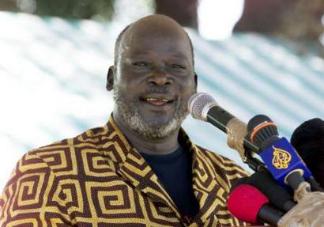Thousands welcome Sudan rebel leader in war-scarred town

By Bogonko Bosire
RUMBEK, Sudan, Sept 30 (AFP) — Thousands of southern Sudanese on Tuesday turned out in the war-scarred town of Rumbek to hear rebel leader John Garang describe the latest advances in efforts to end 20 years of devastating civil war.
More than 10 bulls were slaughtered to welcome Garang in the town’s Freedom Square, 900 kilometres (560 miles) south of the capital Khartoum, where some people sang, others cried and a few fainted from the intense heat.
“The war has been long and people have been fatigued — the government’s side and even me — but I shall not surrender you,” Garang told the rally on a bumpy football pitch.
The rebel leader, accompanied by top commanders from the Sudan People’s Liberation Army (SPLA), was in Rumbeck to update people on peace talks being held in Kenya which aim to halt Africa’s longest conflict, in which at least 1. 5 million people have been killed.
In Kenya last week, Garang and Sudanese Vice President Ali Osman Taha signed an agreement on crucial security arrangements for the south over a six-year interim period which is to begin after a widely-expected comprehensive peace deal.
“In Naivasha (the Kenyan town where peace talks were held), we negotiated with Vice President Taha for 21 days, each day representing one of the 21 years that we have been fighting for our freedom,” Garang said.
While thousands listened in the dusty town, which was taken over by the SPLA in May 1997, rebel soldiers stood guard nearby, armed with heavy machine guns mounted on pickup trucks, while others brandishing Kalashnkovs patrolled the neigbourhood.
The ranks of the crowd were filled with anxious adults and scantly-dressed children with visible signs of malnourishment.
Among them, an old woman cried aloud at the site where her son was killed by government forces in 1997.
The listeners on the whole welcomed the security deal with guarded optimism because it paves the way for government troops to leave most of their southern positions.
“The problems of poverty still persist,” Kuok Maar, a woman who was born when an earlier bout of the north-south war started in 1956, told AFP.
“We are happy that the government will never bomb us again, but people will continue to be unhappy because they want food,” she explained from the edge of the rally near a bombed-out house, one of the many signs of war in Rumbek.
Garang told the rally that he had decided to sign the agreement because it treated southern rebel forces as equals with government troops.
“We accepted the agreement because it recognized the SPLA and a national army, similar to the government army,” he added.
Garang also addressed local divisions.
“There are problems ahead of us, we need unity within rank and file in the south, and people must be united so that a peace agreement is properly implemented,” Garang said.
Garang also encouraged some southern Sudanese people fighting alongside the government, mostly militias, to return to the SPLA fold.
“We welcome our brothers, who have been fighting alongside the government to come back, and we shall integrate them into the army, police and civil service,” Garang said.
“I call upon them to come and join us,” he said, explaining that the security deal would bring “just peace for development and stability.”
